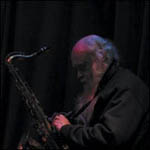|
|
 |
Dusted Reviews
Artist: Paul Flaherty Album: Whirl of Nothingness Label: Family Vineyard Review date: Sep. 5, 2006 |

|
|
|
 |
Paul Flaherty’s raw tone, the manifest exertion and passion in his playing, the heroic determination that has kept the guy playing his music on chilly, indifferent New England streets and back rooms for decades all seem to beg for hyperbole. But if you get close enough to the sounds he makes and the questions they ask, such devices aren’t really necessary; the coarse-yet-fluid cries that he squeezes through his alto and tenor saxophones, and the mortal emptiness that surrounds them on this solo recital, are quite big enough. But truth be told, Flaherty’s discography is also pretty large. How necessary is this record?
Flaherty’s liner notes make clear that he felt like he had to make it; he postponed another project expressly so he could play these anguished meditations on the indivisibility of suffering and existence. Note the title; when you play by yourself, nothingness indeed whirls around you. The lack of another human to butt up against, like drummer Chris Corsano on the recent The Beloved Music, amplifies the pathos in Flaherty’s playing. On “Firetrance Lonely Heartache Still,” for example, he starts with a lovely, almost genteel melody. He soon ventures into Ayler-esque emoting, then rippling shrieks. Then he throttles back, only to work his way up again; the contrast makes the performance much more powerful than if it had all been in one register.
But that same solitude also goads him to literally cry into the void on the penultimate “Monsters Hide in Plain Sight Dark.” After building to a tragic crescendo, Flaherty takes his horn from his lips and screams. I don’t doubt his sincerity, but it feels like an admission of failure, that his sax can’t say it all. Only the short, scorching blasts that follow those screams are more powerful than his naked voice.
Flaherty’s search for something more momentarily comes up with less, and I have to wonder if a suitable skeptical producer or accompanist might have encouraged some judicious editing. So while I wouldn’t start someone new to his discography with this record, it’s a worthy document of one man’s struggle over the long hall.
By Bill Meyer
|







